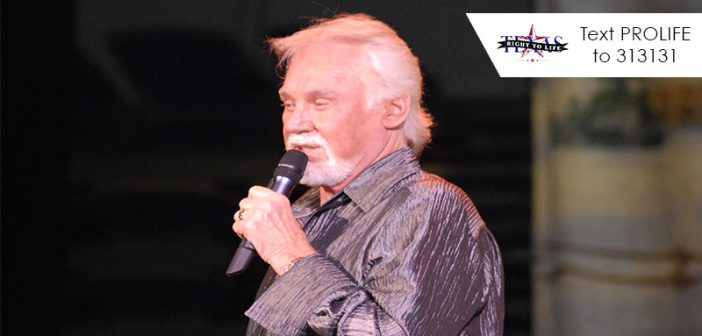Country music superstar Kenny Rogers, who passed away at age 81 in March, sang a song that resonates with millions of men around the world. The song, the title track from his 2006 album “Water and Bridges,” tells the story of a father’s grief following an abortion. Although abortion activists wrongly portray abortion as a “women’s” issue, the reality is that an abortion decision affects every member of a family and community.
Rogers told CNN at the time of the album’s release that the story in the song was “really about choices you make when you’re young that you pay for when you’re old.” Rogers explained about the song, “It starts off with a young couple who have an abortion. And the guy says, ‘If a father could hold his son, I could undo what’s been done, but I guess everyone is living with water and bridges.’”
The song follows a young couple facing an unplanned pregnancy and the couple’s decision to end their baby’s life in an abortion. The song opens, “I was young, so was she / Life didn’t stay a mystery / For very long / We could do no wrong.” The story continues, “When she called, said she was late / So we took a little drive upstate / And took care of that / Yeah, just took care of that.”
The decision of the young couple is portrayed so cavalierly and flippantly, but the father looking back at the decision later in life is filled with regret. Rogers sings, “But now I’m lookin’ back at some of my decisions / Now that it’s much too late to change / How a father could have held his son / If I could undo what’s been done / But I guess everyone is living with water and bridges.”
Although Rogers chose the song because he seemed to feel the message would resonate with listeners, he did not write the lyrics. The song was the work of country music writer Craig Wiseman. Wiseman said of himself, “I’m not a songwriter. I’m just a writer.” He explained, “You observe the stuff everybody observes — what makes people point at the radio and go, ‘Exactly!’ ‘Man, that’s just how it was.”’ The prevalence of abortion since the legalization of elective abortion in our nation and many nations around the world means that, sadly, many fathers can likely relate to the song and the pain expressed by the singer.
Rogers explained why he was drawn to Wiseman’s work, saying, “Music should do one of three things: it should make you laugh, make you cry, or make you think.” There is no doubt that “Water and Bridges” succeeds in making people cry and think about an abortion decision in a way that moves beyond the oversimplification and empty rhetoric of the abortion industry. Although the mainstream media has cooperated with the abortion industry in spreading the lie that abortion is a “woman’s right,” the gruesome reality of abortion is that the violent procedure ends a unique human life and often irrevocably damages the lives of everyone around that child.
Other artists have written and performed songs about abortion regret, many of them deeply and painfully personal, but there are only rare examples of men’s stories of abortion regret. Despite the near total silence in popular culture about a father’s abortion regret, there is evidence that many men feel intense grief and regret in the years and decades following an abortion decision. The pain can be particularly intense because many fathers have no legal recourse to protect their preborn babies if the mother decides to undergo an elective abortion.
Describing his girlfriend’s decision to undergo an abortion, one father said, “I didn’t know how I was going to survive; I wasn’t going to jump off a bridge, but I probably would have drank myself to death.” He added, “I’ve thought about what happened every day for the last 32 years.” Other fathers similarly report that following an abortion decision, even one they proposed, they were left “depressed” and with “deep scars” and “guilt.”
Rogers will be remembered for his decades of country music. He also leaves a legacy in a raw and emotional song expressing what is so often ignored in our culture: a father’s pain following the death of his child in an abortion.

